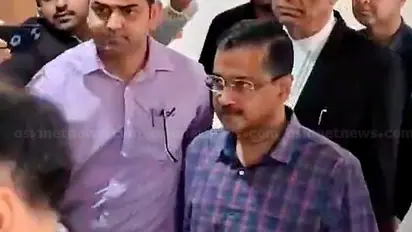BJP slams AAP's 'drama' as Arvind Kejriwal sends second order from ED custory

Synopsis
Arvind Kejriwal was arrested by the ED officials in connection with the excise policy case, and will remain in ED custody until March 28. This recent directive marks Kejriwal's second order from custody, following his earlier order to Water Minister Atishi regarding water and sewage concerns in the city.
Despite being in Enforcement Directorate (ED) custody, jailed Delhi Chief Minister Arvind Kejriwal on Tuesday (March 26) issued his second directive, instructing Delhi Health Minister Saurabh Bharadwaj to ensure an adequate supply of free medicines at Mohalla Clinics.
Addressing a press conference, Bharadwaj highlighted Kejriwal's concern for the health of Delhi's residents, noting that the jailed chief minister remains focused on addressing critical healthcare needs even from jail.
"In his directive, he emphasized the unavailability of free medicines and tests in certain Delhi hospitals and mohalla clinics, urging swift resolution to these issues," Bharadwaj said.
On March 21, Arvind Kejriwal was arrested by the ED officials in connection with the excise policy case, and will remain in ED custody until March 28. This recent directive marks Kejriwal's second order from custody, following his earlier order to Water Minister Atishi regarding water and sewage concerns in the city.
In his previous order, CM Kejriwal had stressed the importance of cooperation with the chief secretary and lieutenant governor to address the outlined issues effectively.
Meanhile, the Bharatiya Janata Party (BJP) has dismissed Kejriwal's actions as an attempt to garner sympathy, labeling them as a mere "victim card" tactic.
Remarkable! Number of women voters surge from 16 crore to 29 crore in last 5 Lok Sabha elections
"Arvind Kejriwal's sudden concern for Delhi, evidenced by his recent directives, appears as a dramatic attempt to play the victim card," remarked BJP leader Harish Khurana.
Stay updated with the Breaking News Today and Latest News from across India and around the world. Get real-time updates, in-depth analysis, and comprehensive coverage of India News, World News, Indian Defence News, Kerala News, and Karnataka News. From politics to current affairs, follow every major story as it unfolds. Get real-time updates from IMD on major cities weather forecasts, including Rain alerts, Cyclone warnings, and temperature trends. Download the Asianet News Official App from the Android Play Store and iPhone App Store for accurate and timely news updates anytime, anywhere.